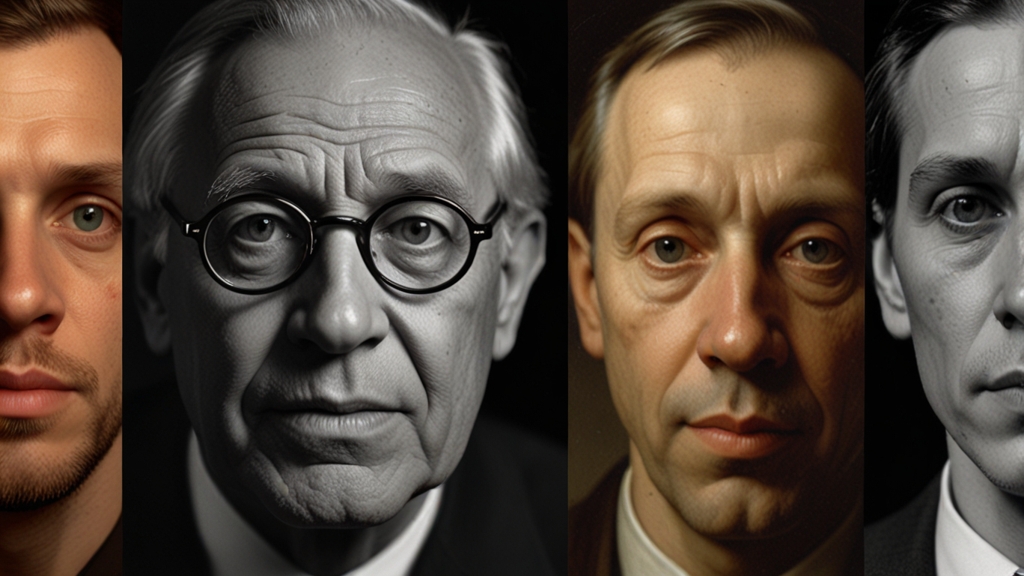Brilliant Minds: Famous Figures Who Changed Logic Forever
Throughout history, numerous brilliant minds have contributed to the evolution of logic, shaping the way we understand and interact with the world. Their pioneering work laid the foundation for advancements in philosophy, mathematics, computer science, and many other fields. In this article, we will explore some of the most influential figures who changed logic forever.
Aristotle: The Father of Western Logic
Aristotle, a Greek philosopher and student of Plato, is often considered the father of Western logic. His work in the 4th century BCE established the foundations of many logical concepts that are still in use today. Aristotle's "Organon," a collection of his works on logic, introduced the syllogism, a form of reasoning in which a conclusion is drawn from two given or assumed propositions (premises).
"The principles of logic are common to all things that have a nature and apply to everything that has a being." - Aristotle
Aristotle's influence persisted through the centuries, shaping the medieval scholastic tradition and influencing notable figures such as Thomas Aquinas.
Gottfried Wilhelm Leibniz: The Quest for a Universal Language
Gottfried Wilhelm Leibniz, a German polymath and philosopher of the 17th century, made significant contributions to many fields, including logic. Leibniz's dream was to create a universal logical language that could express all conceptual thought and simplify complex reasoning. His development of binary arithmetic laid the groundwork for modern computing.
Leibniz also introduced the concept of possible worlds in logic and philosophy, which later became crucial in modal logic and the study of necessity and possibility.
George Boole: The Boolean Algebra
In the 19th century, British mathematician George Boole revolutionized logic with his creation of Boolean algebra. Boolean algebra is a system of mathematical logic that uses binary variables (true/false, 0/1) and logical operations (AND, OR, NOT). Boole's work, detailed in his 1854 book "An Investigation of the Laws of Thought," has had a lasting impact on computer science and digital circuit design.
"... the general laws of symbolical reasoning are precisely the same as the laws of the combination of symbols used in the science of numbers." - George Boole
The simplicity and power of Boolean logic underpin virtually all modern digital technology, from microprocessors to software algorithms.
Alfred Tarski: Formal Semantics and Model Theory
Polish logician Alfred Tarski made monumental contributions to logic in the 20th century, particularly in formal semantics and model theory. Tarski's work provided a rigorous foundation for understanding the relationship between language and reality. His concept of "truth in a model" became a cornerstone of modern logical theory.
Tarski's influence extended to various branches of mathematics and philosophy, and his legacy includes major publications such as "The Concept of Truth in Formalized Languages" (1933).
Alan Turing: The Pioneer of Modern Computing
Alan Turing, a British mathematician and logician, is widely regarded as the father of theoretical computer science and artificial intelligence. His seminal 1936 paper, "On Computable Numbers," introduced the concept of the Turing machine, a theoretical device that manipulates symbols on a strip of tape according to a set of rules. This concept became the foundation for the modern computer.
Turing's work during World War II on code-breaking systems and his post-war contributions to the development of the first electronic computers were instrumental in the digitization of logic and the birth of the computing era.
"We can only see a short distance ahead, but we can see plenty there that needs to be done." - Alan Turing
Conclusion
The history of logic is rich with visionary thinkers who have profoundly influenced our understanding and utilization of reasoning. From Aristotle's early syllogisms to Turing's groundbreaking work in computation, these brilliant minds have paved the way for countless advancements across multiple disciplines. Their legacies continue to inspire and guide contemporary research and innovation, proving that the quest to understand and perfect logic is a timeless endeavor.











